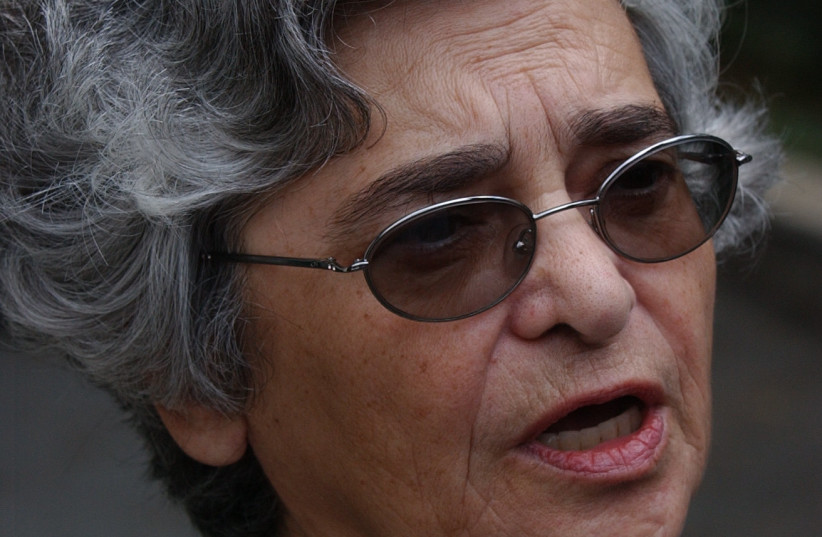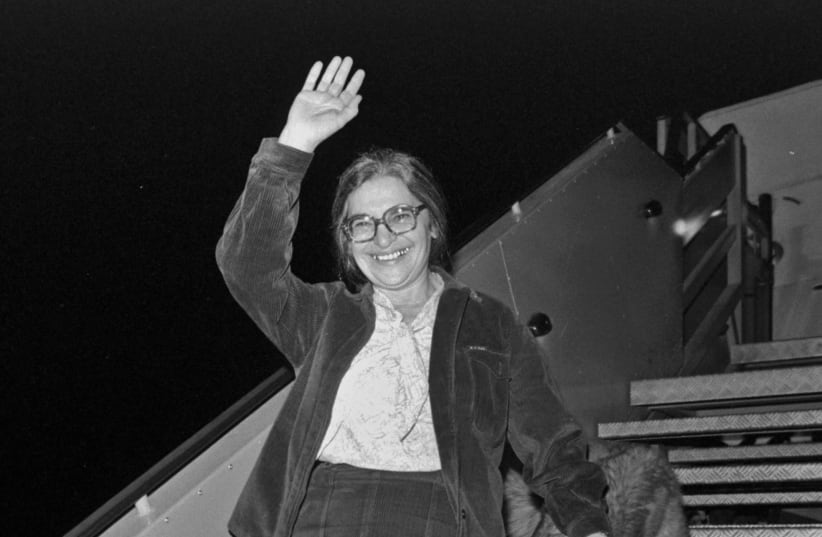Ida Nudel, the diminutive Prisoner of Zion who made aliyah after winning her battle against the Soviet Union, died on Tuesday at 90. She was buried at the Yarkon Cemetery in Tel Aviv.
Known as the “Guardian Angel” for the campaign she led to provide humanitarian items for Prisoners of Zion in Soviet jails, Nudel – who was just 4’11” (less than 1.5 meters) tall – was the best-known female refusenik.
She famously won the support of Jane Fonda, who visited her during her four years of exile in Siberia, and Liv Ullmann, who played her in a film based on her autobiography.
Calling her “a symbol of the struggle for aliyah from the Soviet Union,” Prime Minister Naftali Bennett said that “while she was short in stature, she had a giant spirit. The story of Ida’s life, which arouses interest and admiration around the world, is the story of the immigrants and the entire Jewish people – the yearning for Zion, love of the country, and the struggle to immigrate to the Land of Israel at any cost.
“Even after she immigrated, she continued to act in Israel for the education of the children of the new immigrants, to whom she was devoted until her last day. Ida Nudel was an exemplar of Jewish heroism for us all.”
President Isaac Herzog recalled how excited was his father, former president Chaim Herzog, to greet Nudel when she finally made aliyah. “It’s important to remember and commemorate the stories of the Prisoners of Zion who with spirit and bravery changed the world,” Herzog said.
Born in 1931 in the Black Sea port of Novorossiysk, Nudel sought to make aliyah after hearing in 1970 of the attempt by a group of refuseniks to hijack a plane to flee the Soviet Union. She was refused an exit visa by the Soviet authorities on the grounds that she was privy to state secrets in her job as an accountant for the Moscow Institute of Hydrology and Microbiological Synthesis.


For 16 years, she worked on behalf of imprisoned Soviet Jews, sending them gifts, smuggling vitamins into their prisons, submitting court appeal applications and offering their families support.
After her sister, Elena Fridman, together with her husband and son, were granted exit visas in 1972, she organized a hunger strike at Communist Party headquarters to protest the arrest of another refusenik, Vladimir Markman. She lost her job, and after placing a protest poster in 1978 against the KGB in her apartment which read, “KGB, Give Me My Visa,″ was banished to Siberia for four years. After being released in 1982, she was banned from returning to Moscow, suffering hardships in the Moldavian town of Bendery for five years.
After the gates of the Soviet Union were finally opened, she was granted an exit visa and flew to freedom on US oil magnate Armand Hammer’s private plane.
Nudel received a hero’s welcome on October 15, 1987, at Ben-Gurion Airport, where she was greeted by prime minister Yitzhak Shamir, foreign minister Shimon Peres and thousands of others, including her beloved sister.Holding her new Israeli ID card close to her heart and wiping away tears, she declared: ″The moment came. I am on the soil of my people: at home.″
Her aliyah coincided with an improvement in relations between the Soviet Union and Israel, which Moscow had severed after the Six Day War. Then-US secretary of state George Shultz, who campaigned successfully for the Nudel’s freedom and that of other Soviet Jews, said: ″Every once in a while something happens which is unambiguously good and gives you a feeling that at least some things are on the right track.”
Fonda praised Nudel, saying: ″I thank her for teaching me one very important thing: to never lose hope.”
Nudel moved to Karmei Yosef, a farming settlement in the Judean foothills, and in 2008 to Rehovot, to be close to her sister. She established the “Mother to Mother” nonprofit, which provided after-school activities for the children of immigrants from the former Soviet Union.
Establishing a name for herself as a right-wing human rights activist, she petitioned the High Court of Justice in 2005 to pressure then-prime minister Ariel Sharon to take action on behalf of 15 Palestinian collaborators facing death sentences in Palestinian Authority jails.
Two years later, she demanded that visitation rights be denied to Hamas prisoners as long as the Red Cross was prevented from visiting the three IDF soldiers abducted by Hamas and Hezbollah, Gilad Schalit, Eldad Regev and Ehud Goldwasser.
Her autobiography, A Hand in the Darkness, was turned into an award-winning Italian film called Mosca Addio (Farewell Moscow) by Mauro Bolognini, starring Ullmann.
She never married nor did she have children. Asked by JTA after she arrived in Israel what she had brought with her from the Soviet Union, she replied, “My faithful dog, Pizer – who has been my constant companion since she was brought to me in Siberia as a five-week-old puppy – my books, and the very warm blanket which I cannot do without.”
